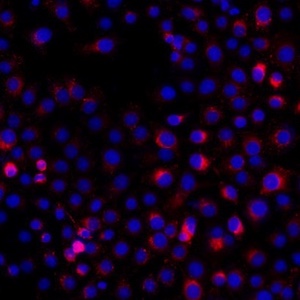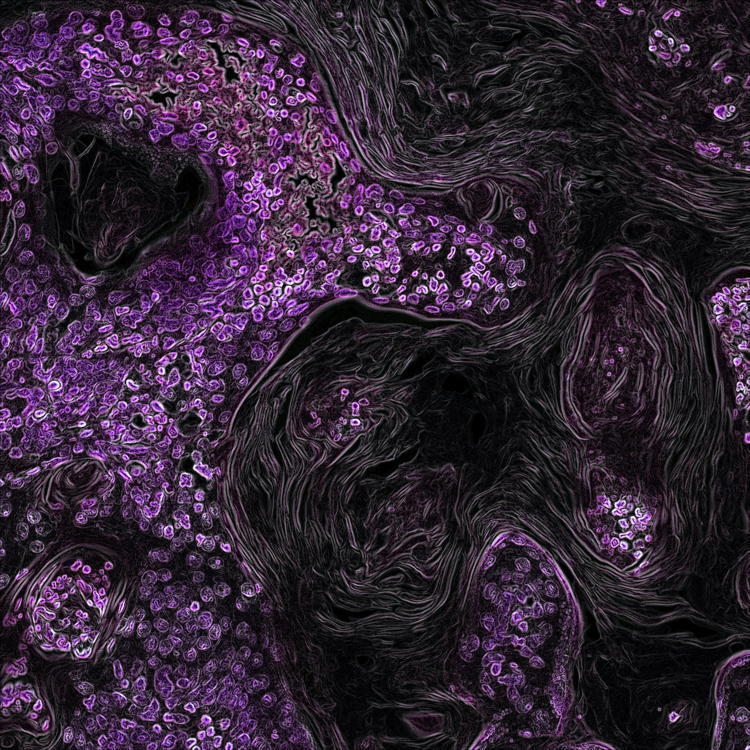Tumor cells-derived exosomal PD-L1 promotes the growth and invasion of lung cancer cells in vitro via mediating macrophages M2 polarization

Submitted: 27 May 2023
Accepted: 3 July 2023
Published: 1 August 2023
Accepted: 3 July 2023
Abstract Views: 723
PDF: 519
HTML: 10
HTML: 10
Publisher's note
All claims expressed in this article are solely those of the authors and do not necessarily represent those of their affiliated organizations, or those of the publisher, the editors and the reviewers. Any product that may be evaluated in this article or claim that may be made by its manufacturer is not guaranteed or endorsed by the publisher.
All claims expressed in this article are solely those of the authors and do not necessarily represent those of their affiliated organizations, or those of the publisher, the editors and the reviewers. Any product that may be evaluated in this article or claim that may be made by its manufacturer is not guaranteed or endorsed by the publisher.
Similar Articles
- Kazuhiko Hashimoto, Shunji Nishimura, Yu Shinyashiki, Tomohiko Ito, Ryosuke Kakinoki, Masao Akagi, Clinicopathological assessment of PD-1/PD-L1 immune checkpoint expression in desmoid tumors , European Journal of Histochemistry: Vol. 67 No. 2 (2023)
- Cecilia Dall'Aglio, Angela Polisca, Maria Grazia Cappai, Francesca Mercati, Alessandro Troisi, Carolina Pirino, Paola Scocco, Margherita Maranesi, Immunohistochemistry detected and localized cannabinoid receptor type 2 in bovine fetal pancreas at late gestation , European Journal of Histochemistry: Vol. 61 No. 1 (2017)
- Yangying Peng, Shaojie Ding, Ping Xu, Xueyan Zhang, Jianzhang Wang, Tiantian Li, Liyun Liao, Xinmei Zhang, CCL18 promotes endometriosis by increasing endometrial cell migration and neuroangiogenesis , European Journal of Histochemistry: Vol. 68 No. 3 (2024)
- Tao Wu, Shikui Wu, Hailu Jiao, Jun Feng, Xiang Zeng, Overexpression of hsa_circ_0001861 inhibits pulmonary fibrosis through targeting miR-296-5p/BCL-2 binding component 3 axis , European Journal of Histochemistry: Vol. 67 No. 4 (2023)
- David Cajas , Emanuel Guajardo, Sergio Jara-Rosales, Claudio Nuñez, Renato Vargas, Victor Carriel, Antonio Campos, Luis Milla, Pedro Orihuela, Carlos Godoy-Guzman, Molecules involved in the sperm interaction in the human uterine tube: a histochemical and immunohistochemical approach , European Journal of Histochemistry: Vol. 67 No. 2 (2023)
- G. Tsirakis, C. A. Pappa, M. Kaparou, V. Katsomitrou, A. Hatzivasili, T. Alegakis, A. Xekalou, E. N. Stathopoulos, M. Alexandrakis, Assessment of proliferating cell nuclear antigen and its relationship with proinflammatory cytokines and parameters of disease activity in multiple myeloma patients , European Journal of Histochemistry: Vol. 55 No. 3 (2011)
- S. Nemolato, T. Cabras, M.U. Fanari, F. Cau, M. Fraschini, B. Manconi, I. Messana, M. Castagnola, G. Faa, Thymosin beta 4 expression in normal skin, colon mucosa and in tumor infiltrating mast cells , European Journal of Histochemistry: Vol. 54 No. 1 (2010)
- V. Matozzo, M. G. Marin, First cytochemical study of haemocytes from the crab Carcinus aestuarii (Crustacea, Decapoda) , European Journal of Histochemistry: Vol. 54 No. 1 (2010)
- Cristina Maxia, Daniela Murtas, Michela Corrias, Ignazio Zucca, Luigi Minerba, Franca Piras, Cristiana Marinelli, Maria Teresa Perra, Vitamin D and vitamin D receptor in patients with ophthalmic pterygium , European Journal of Histochemistry: Vol. 61 No. 4 (2017)
- Q. Li, F. Zhang, S. Zhang, X. Sheng, X. Han, Q. Weng, Z. Yuan, Seasonal expression of androgen receptor, aromatase, and estrogen receptor alpha and beta in the testis of the wild ground squirrel (Citellus dauricus Brandt) , European Journal of Histochemistry: Vol. 59 No. 1 (2015)
<< < 10 11 12 13 14 15 16 17 18 19 > >>
You may also start an advanced similarity search for this article.

 https://doi.org/10.4081/ejh.2023.3784
https://doi.org/10.4081/ejh.2023.3784











